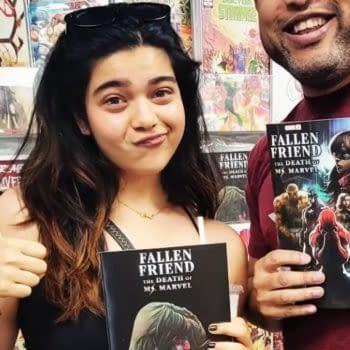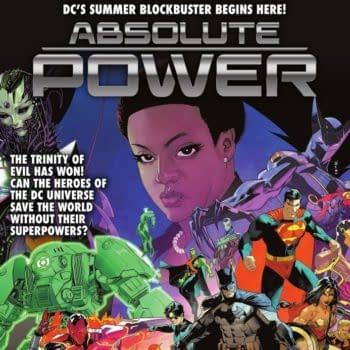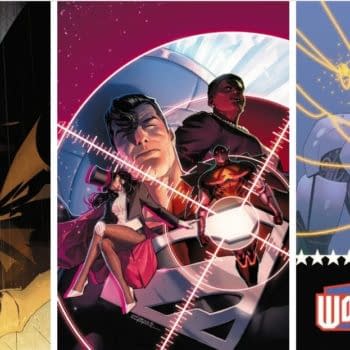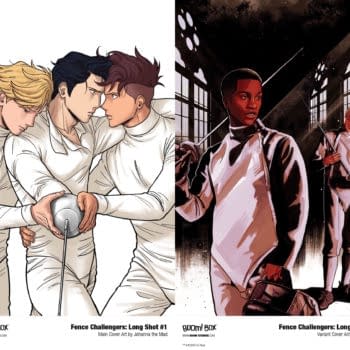Posted in: Comics | Tagged: boom studios, Borys Kit, Comics, entertainment, film, Matt Sugarman, ross richie, Stephen Christy, tv, wondercon, Wondercon 2015
WonderCon '15 – Your Comics In Hollywood – The Boom! Studios From Page To Screen Panel With Ross Richie, Stephen Christy, Borys Kit, And Matt Sugarman

Kit asked the panelists if this is a better time to be a comic creator than in previous decades. Richie said it's a great time to be one, especially for translating comics into film, "every single studio wants them", he added. The thing "unique about comic talent", Richie said, is that creators "think the medium is high concept", which is helpful. If nothing has happened in the plot of a novel early on, it won't work as a film, he said, but since comics are a quicker medium, where things have to happen within a few pages, is "conducive" to the film medium also. Richie pointed out that comics which are "high concept" are featuring well for retail sales in comic shops and also attract the attention of studios.

Sugarman says that studios have started looking for big budget movies and things that can franchise, even more than in the past, with an "explosion of channels" on the TV side. Everyone "need original IP", he said, which lends to reaching for comic books because they can be translated well.
Kit asked what the "first step" is for someone with a comic, but no publisher etc. Sugarman said that unless you already have connections, you need to go to conventions to meet people, whether publishers, or fellow writers or artists. If you're a writer but have no other connections, it's better to be introduced in person by others at conventions.
Richie added that the the reason for this is the "absolutely staggering" flood of submissions that publishers receive. He said that though it sounds harsh, there are works composed of stick figures and there are works of great value, but either way he's "buried" in submissions. His "quick sidebar" to breaking into comics included the fact that Boom is trying to hire the "hottest people in the marketplace" who are already professionals. As a newcomer, it's hard to start, he said, though Archaia does allow "open submissions", one of the few options in comic publishers right now. To "break through the noise", Richie said that putting something on the web with your artist is the best idea. He commented that worrying your idea will get stolen is not the main concern since the success lies in the execution, and working on comics requires trial and error. Complete something and put it on the web, he said. He referred to the 10,000 hour rule where needing experience will hold you back, whereas taking the time to make mistakes will lead to "good stuff". The example of online content he mentioned is often published as well, perhaps through Kickstarter. Handing the comic to a publisher might lead to a publishing deal. Richie narrated the story of one such comic winding up at Boom.
Kit asked what happens once you have a comic but want to "make a deal", since different publishers have different ideas of what rights they keep etc. Richie asked if you're sitting at a booth and an "agent" comes up to you, how would that be different from a manager or a publisher?
Sugarman explained that an agent is a registered person who is allowed to procure work for you. An agent should charge no more than 10% he said, the same as a manager should. Sometimes you don't need an agent, though, Sugarman said. They may not be finding things for you, he said, but if you find one that's a great thing. Some good agents will go looking for work and set up meetings, but some will just let the phone ring and see what comes in. Managers are not technically supposed to "go out" looking for work for you, however. Agents tend to have lots of clients, Sugarman said, whereas managers have more time and focus, with smaller client lists. Managers will go through scripts with you and spend the time doing so. It's now the exception if agents do so.
Asked how attorneys function within this paradigm, Sugarman said that that attorneys negotiate deals for the client, as Sugarman has with Boom from film and TV to comics and from comics to film and TV. He's involved sometimes from the beginning to the end of a project, but isn't usually involved in creative areas. An agent's job is to "shop for you", he clarified, but they don't have experience negotiating deals. An attorney will negotiate details and make sure the documents are correct as a full-time job. Sugarman warned that people, whether agents or attorneys, may say they understand how to work with comic books, but they may not, in fact, know much about how to split deals and the like. Christy commented on having an experience where a comic contract sat in an agency for months because they literally did not know how to write a comic contract when otherwise it would have moved forward.
Sugarman agreed that huge delays can creep in on "simple deals" when people don't know how to handle comics legally or "do comic book deals". Kit asked what a "comic book deal" entails. Sugarman said there are big advantages to having a comic first before a film deal. If you write a screenplay, the studio takes all the rights from that "package". If it's a comic first, you get to "keep stuff", he said, including "classic merchandising rights" based on the comic book. If a movie becomes successful, it can lead to big profits down the road. If it had just been a screenplay, you would not have those perks. Kit mentioned the example of Star Wars where George Lucas managed to keep the merchandizing rights, an "astronomical" impact financially.

So how do comic book deals work with media rights? Some publishers have none, some have everything, and with Boom it's about 50/50, Richie said. By comparison, Image doesn't have any control or interest in those projects. Image facilitates "you" to be the publisher, and it's your project. Whereas some companies have "splits" of 70/30, 60/40, a full range. Marvel and DC own and control the comics they publish, as well as Valiant. The creators don't have ownership there. Boom "believes in sharing equally with creators", Richie said, with a 50/50 split. Sugarman commented on it as a "true share" that's very fair.
Richie told the story of Two Guns, published as a comic in 2007, which was shopped, and Richie eventually made a deal with Universal. It wasn't an easy road, he said, and walked through the nature of "options", which are essentially like putting a comic idea on layaway. If a movie is eventually made, a big payment may come in. Two Guns came through around 4th of July, and Richie knew the company, like many, would be shut over the holiday, so he went into the reception area and waited for the creator's check. He waited until 1pm, then flew to Las Vegas to meet with the creator where he surprised him with the check personally. It was a big exciting moment for them. Richie said that because the split is even, the publisher and the creator are a "team" where both are invested in success. Walking down a red carpet takes on a new meaning in this way.
Sugarman explained some of the "economics of comics" to the audience. They are an "expensive proposition to make", he said, which many people don't realize, with the writer, artist, colorist, inker, cover design, marketing, and the like. They are not a "cheap, easy thing" though their low cost may make it seem that way. Look at the comics you read, he encouraged, where you can see the difference in detail that means quality or lack thereof. Sugarman finds himself having to explain this to clients to clarify why the comics creators deserve a fair amount of pay.
Richie added that there's a "finite number" of projects a publisher can do at a time, which is also a cost of turning others away in favor of a project, which adds to expense. Printing and shipping are expensive too, he reminded. Distributors don't "have any risk", he commented. The biggest misconception readers have, he said, about comics, is not realizing the expense of making comics and the risk involved.
Sugarman said he thinks the biggest misconceptions are that comic creators will remain in control once they make film or TV deals. Studios won't listen to "just a comic book writer" unless you happen to be Grant Morrison, he said. Maybe then. It's about "giving up your baby", he warned. Richie commented that to a comic creator 150,000 seems like a big deal but studios are working in millions of dollars, where a studio needs to make 400 million dollars to break even at the box office. For that reason, they are unlikely to really care about the "creative vision" of the creator. Simply put, they want control because of the sum of money involved.

Richie asked Kit what to do if you have a bunch of meetings and your comic has sold, has been optioned, what the odds are that it will be made into a movie finally. The odds aren't great, Kit said. Richie believed the number to be only 8 percent of optioned films are made. There are a limited number of "slots", Kit said, as well as "development hell". It takes 8 or 9 years from acquisition through the studio system of writing, rewriting, actors leaving, before a film made. No one is an overnight success, Sugarman said. It's a myth. Kit said that if you sell several comics for options, it may pressure the previous purchasers into finally doing something.
Christy said it's important not to get caught up in thinking one film option is your only good idea. You need many to achieve success. It's a long road.
During the Q&A, the panelists focused on the fact that you, as a comics creator, should not be in expectation of being the screenwriter on your optioned property too. Studios have their own screenwriters, and that is much more likely to happen. It's extremely rare to happen that way.
It was a sobering panel, but a necessary one that may well help keep creators from falling victim to misconceptions, assumptions, or never making the first steps that may garner them success in comics or in Hollywood.















